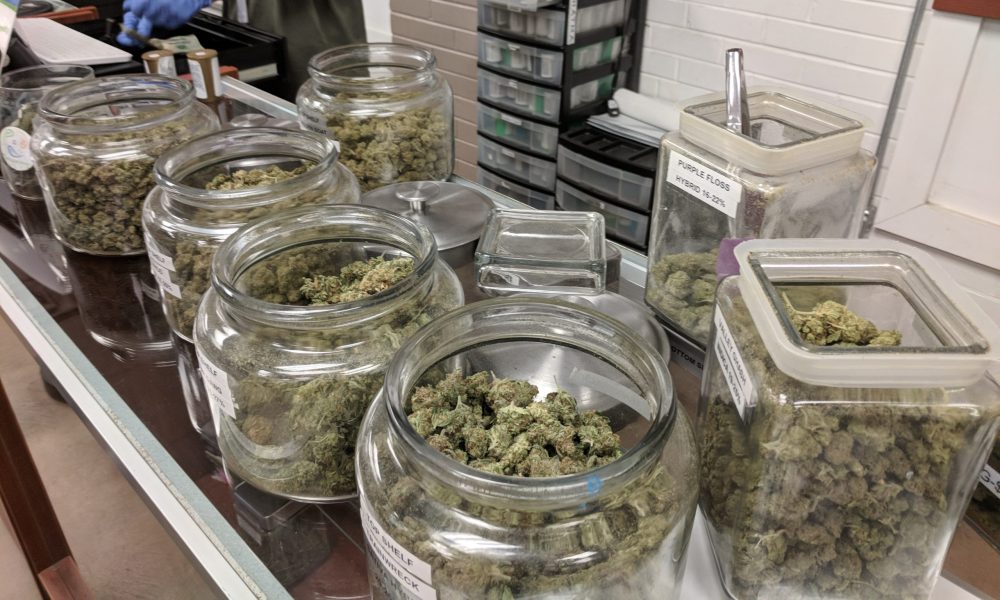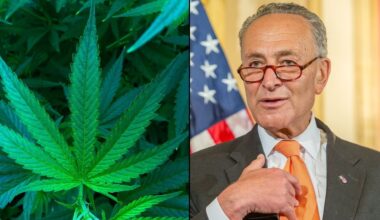A Rhode Island House committee on Tuesday discussed a bill to legalize marijuana in the state, as well as the governor’s separate budget proposal that includes provisions to end cannabis criminalization and create a regulated market.
The hearing on the pieces of legislation from Rep. Scott Slater (D) and Gov. Dan McKee took place in the House Finance Committee, one week after a separate Senate panel took testimony on an identical companion version of the Slater bill that’s being sponsored by Sen. Joshua Miller (D).
The lawmaker-driven bill was introduced earlier this month following months of negotiations between legislative leaders. McKee released his budget proposal with the legalization components in January.
“I’ve been supporting legalization of cannabis for a number of years,” Slater told fellow lawmakers at Tuesday’s hearing. “I just think it’s the best public policy” and is “long overdue.”
Referring to Rhode Island’s neighboring states that have already enacted legalization, he called Rhode Island “kind of an island of prohibition, surrounded by legal cannabis around us.”
“We’re already dealing with it,” he said. “We might as well take the revenue in” by legalizing sales.
Meanwhile, advocates who testified continued to raise concerns about what they view as insufficient equity provisions included in the legislation, specifically taking issue with a component requiring those with past cannabis convictions to proactively petition for relief, rather than have the process automated by the state.
Miller, who sponsored an earlier legalization proposal that was approved in the Senate last year, told fellow lawmakers at the Senate committee hearing last week that “we’ve made our best attempt” to get the provisions right, stressing that he is broadly open to feedback on and changes to the bill as it moves through the legislative process.
—
Marijuana Moment is already tracking more than 1,000 cannabis, psychedelics and drug policy bills in state legislatures and Congress this year. Patreon supporters pledging at least $25/month get access to our interactive maps, charts and hearing calendar so they don’t miss any developments.![]()
Learn more about our marijuana bill tracker and become a supporter on Patreon to get access.
—
In contrast to the Slater and Miller bills that were taken up in committees this and last week, the governor’s legalization plan has provisions to automatically expungement prior convictions, without language requiring a person to petition the courts to receive that relief.
McKee voiced support for his own proposal for a “privately-run but tightly regulated” legal cannabis market in written testimony to the House committee, emphasizing its inclusion of automatic expungements.
“We know that the war on drugs disproportionately impacted people of color, and with the legalization of adult-use cannabis, now is the time to act,” he wrote. “We know that petition-based processes do not often have the desired effect, whether that be due to access to information, legal counsel, application fees, or other barriers; I want to make sure impacted Rhode Islanders get the relief they deserve, and I am proud to include automatic expungement in my budget.”
.@GovDanMcKee testimony on his own marijuana proposal emphasizes his bill includes automatic (he puts it in italics) expungement of past possession charges
The Rep. Slater bill being heard tonight in House Finance Committee has expungement, but not automatic pic.twitter.com/6DNApFKfpP
— Steph Machado (@StephMachado) March 22, 2022
“Even though the social climate is changing, the stigma of having a record continues to pose barriers when applying for jobs, housing, and more,” the governor said.
Meanwhile, the separate standalone legislation as drafted in both chambers would create a system of licensed businesses to produce and sell cannabis while allowing adults 21 and older to purchase and possess up to an ounce. They could also grow up to six plants at home, three of which could be mature. The allowable possession limit for marijuana stored in a given household would be maxed out at 10 ounces.
One of the main questions that has divided legislators in the lead up to the introduction of these companion bills concerns whether adult-use marijuana should be regulated by an existing agency or a newly created body.
Lawmakers ultimately decided on hybrid model, with responsibilities being shared by a new independent Cannabis Control Commission (CCC) and a Cannabis Office under the Department of Business Regulation (DBR). A new advisory board would also assist.
House Speaker Joseph Shekarchi (D) previously said that he’d be open to a compromise on regulatory structure and hinted at the possibility of the hybrid model.
McKee’s budget proposal, on the other hand, would put DBR alone in charge of regulating the cannabis industry.
DBR Director Liz Tanner told the Finance Committee that the legislative-driven proposal is largely “in alignment” with the governor’s plan “in several important respects.” But she did point out several areas of concern for the administration, which she said, if “left unaddressed, may significantly complicate the expedient realization of a robust and well-regulated adult-use marijuana regime in Rhode Island.”
A key area of contention surrounds the bill’s provisions to have the governor name the members of the new cannabis commission from list of potential appointees that legislative leaders would first compile. The system would be “complex, cumbersome, and raises concerns related to separation of powers,” she said.
Spokespersons for legislative leaders have pushed back against the administration’s interpretation, which was also voiced at the earlier Senate hearing, however.
“This bill, and specifically the appointment process, is consistent with Rhode Island’s separation of powers principles and the law flowing from the Rhode Island Supreme Court,” they said in a joint statement to The Providence Journal last week.
“The legislation is not treading on new constitutional ground, the legislative officials said, arguing that the proposed framework “is similar to the process used in the I-195 Redevelopment District Commission and the Judicial Nominating Commission.”
But the advocacy group Common Cause Rhode Island, for its part, testified that it shares the McKee administration’s concerns about the proposed appointment process, saying that even though there is a precedent for using lists for the governor to make appointments from, the practice still violates separation of powers principles.
The Finance Committee did not vote on the cannabis legislation on Tuesday, instead holding the proposals for further study and potential future action.
Under the bicameral proposals, adult-use marijuana sales would be subject to the state’s seven percent sales tax, a 10 percent excise tax and a local three percent tax for municipalities that allow cannabis businesses to operate. Localities would be able to opt out of permitting marijuana businesses if they put it to a vote on the November 2022 ballot.
For the initial rollout, a total of 33 marijuana retailers could be licensed. Twenty-four of those licenses would be new standalone adult-use retailers, divided up equally between six geographic zones of the state, and nine other hybrid licenses could be approved for existing medical cannabis dispensaries if they pay a $125,000 fee for the privilege to add recreational sales.
Of the 24 standalone retailers, 25 percent would need to go to social equity applicants and another 25 percent would be for worker-owned cooperatives.
No single entity would be allowed to possess more than one business license, but people could invest in multiple companies.
Under the legislation, legalization of possession of up to one ounce would begin on October 1, 2022—and sales would start then too, though it’d be initially limited to existing medical cannabis dispensaries that pay a fee to operate as hybrid medical-recreational retailers. Possession of more than one ounce but up to two ounces for adults 18 and older would be decriminalized, with people facing a civil penalty without the threat of jail time.
Advocates have been pushing for comprehensive reform and an end to criminalization, but they’ve also made clear their desire for a revised expungement provision that puts the onus on the state to automate record sealing for those with prior marijuana convictions.
“The non-state initiated system proposed has had much less efficient and effective results in states that have gone ahead with the model, with less than 5 percent of eligible applicants actually seeing any relief,” Jordan Goyette of Reclaim RI told lawmakers. “The economic impact of clearing and sealing as many records as possible alone should be reason enough for automatic expungement, as the expansion to the labor pool it will create could not come at a more necessary time.
“No person who has been harmed by the wars on drugs and specifically cannabis prohibition should have another burden placed upon them,” he said. “No person should be penalized disproportionately to the scale of an offense soon to be regulated similar to any other legal controlled substance. We don’t need to reinvent the wheel of the failed policy of prohibition. We have to break that wheel.”
As introduced, the legislation would require people with prior convictions for possession of up to two ounces of marijuana to petition the courts in order to have their records expunged.
For the Slater and Miller legalization measures, part of the money collected from cannabis licensing fees would support a new “Social Equity Assistance Fund.”
The fund would “provide assistance to applicants from communities disproportionately impacted by prohibition of cannabis,” according to a summary.
Equity business applicants would need to meet one of several criteria to qualify, including at least 51 percent ownership by people who have resided in a disproportionately impacted area for five of the past 10 years, 51 percent ownership by people who have faced arrests or convictions over offenses that would qualify for expungements under the law or having income that does not exceed 400 percent of the median income in a disproportionately impacted area for five of the past 10 years.
A business that has at least 10 employees, with at least 51 percent residing in disproportionally impacted areas or who have been arrested or convicted for an expungable offense offense under the bill would also qualify as would being able to demonstrate significant experience in types of businesses that promote economic development.
Senate President Dominick Ruggerio (D) said in his session opening remarks in January that the bill the body passed last year “included substantial measures to rectify the wrongs associated with the decades-long policies of prohibition.”
Under the Slater and Miller bills, there would be a two-year moratorium on licensing additional cultivators beyond those that are already operating for the medical cannabis market.
Miller previously said that negotiators had reached an agreement to place the temporary moratorium on approving additional cannabis cultivator licenses. Some have protested adding cultivators beyond the existing medical marijuana licensees because they say there’s already a sufficient supply to meet demand in the adult-use market.
Regulators would also be responsible for setting limits on “cannabis product serving sizes, doses, and potency, including, but not limited to, regulations which provide requirements for reasonable tetrahydrocannabinol (THC) potency limits for each type of cannabis product sold by a licensee and reasonable potency or dosing limits for cannabis concentrates and edible products, that shall apply for adult use cannabis only,” according to the text of the bills.
McKee’s legalization proposal that he included in his budget would allow adults 21 and older to purchase and possess up to one ounce of cannabis, though it would not provide a home grow option. Adults could also store up to five ounces of marijuana in secured storage in their primary residence.
Under his plan, 25 percent of marijuana tax revenue and licensing fees would go to the “regulatory, public health, and public safety costs associated with adult-use cannabis.” Fifteen percent would go to local governments and 60 percent would go to the state general fund.
The executive summary of the budget proposal says that the state’s sales tax revenue would be “boosted by the proposed introduction of adult-use cannabis tax revenue in FY 2023.” The state is estimating that it will collect $1.2 million in general revenue for the 2023 fiscal year and $16.9, “with a full year of sales in FY 2024.”
The revenue projections and provisions largely reflect what the governor proposed in his last budget request, with the exception of the new expungements language. Funding a process for expedited expungements is expected to cost the state about $400,000 for fiscal year 2023, the summary says.
Not only does the governor’s plan not allow for home grow, it also sets out a series of fines and penalties for personal cultivation of any number of plants. For example, a person who unlawfully grows one to five plants would face a penalty of $2,000 per plant and an “order requiring forfeiture and/or destruction of said plants,” according to the text of the proposed legislation.
The bill also includes language to create a Cannabis Reinvestment Task Force that would be required to study and issue recommendations on using marijuana tax revenue for “job training, small business access to capital, affordable housing, health equity, and neighborhood and community development.”
The proposal calls for 25 marijuana retailers to be licensed each year for the first three years of implementation. Those would be awarded on a lottery basis, but at least five would be specifically given to minority-owned businesses, a category. Additional licenses would be issued in the future based on market demand.
The Senate president, Ruggerio, has said he feels that the legalization bill that has already been approved in the Senate contained “very strong social justice provisions” and the its expedited expungements provisions are “as close to automatic as practical.”
He also said in July that he’s not disappointed the House hasn’t advanced legalization legislation yet and that “what we really wanted to do was send it over and have them take a look at it” when his chamber passed its cannabis reform measure.
“We’ve been working hard since the end of last session to establish consensus on the details, but our efforts to address the issue have been going on for many years, during which time our neighboring states have already made this move ahead of us,” Senate Majority Leader Michael McCaffrey (D) said. “Rhode Island is now behind them from a competitive standpoint, since it’s fairly easy for most Rhode Islanders to cross the state line to make a legal purchase.”
“The truth is, legal cannabis is already widely available to Rhode Islanders, but the resulting revenue is not. With this bill, we will create jobs, revenue and control in our own state, and help address some of the inequities that have resulted from prohibition,” he said. “I look forward to working with my colleagues, stakeholders and the public to ensure that we take the careful, nuanced and equitable approach we need to transform this economic sector.”
A coalition of 10 civil rights and drug policy reform advocacy groups—including the Rhode Island chapters of the ACLU and NAACP—had demanded that lawmakers move ahead with enacting marijuana reform in the state before the end of 2021. But that did not pan out.
Lawmakers have also noted that neighboring states like Connecticut and Massachusetts have enacted legalization, and that adds impetus for the legislature to pursue reform in the state.
Shekarchi, meanwhile, said in July that he doesn’t intend to let regional pressure dictate the timeline for when Rhode Island enacts a policy change. Social equity, licensing fees, labor agreements and home grow provisions are among the outstanding matters that need to be addressed, the speaker said.
In June, the House Finance Committee held a hearing on an earlier legalization measure that Slater introduced.
The governor previously told reporters that while he backs legalization it is “not like one of my highest priorities,” adding that “we’re not in a race with Connecticut or Massachusetts on this issue.”
“I think we need to get it right,” he said, pointing to ongoing discussions with the House and Senate.
The House Finance Committee discussed the governor’s proposal to end prohibition at an earlier hearing in April.
Both the governor and the leaders’ legalization plans are notably different than the proposal that former Gov. Gina Raimondo (D) had included in her budget in 2020. Prior to leaving office to join the Biden administration as commerce secretary, she called for legalization through a state-run model.
McKee gave initial insights into his perspective on the reform last January, saying that “it’s time that [legalization] happens” and that he’s “more leaning towards an entrepreneurial strategy there to let that roll that way.”
Shekarchi, meanwhile, has said he’s “absolutely” open to the idea of cannabis legalization and also leans toward privatization.
In late 2020, the Senate Finance Committee began preliminary consideration of legalization in preparation for the 2021 session, with lawmakers generally accepting the reform as an inevitability. “I certainly do think we’ll act on the issue, whether it’s more private or more state,” Sen. Ryan Pearson (D), who now serves as the panel’s chairman, said at the time.
Meanwhile, the governor in July signed a historic bill to allow safe consumption sites where people could use illicit drugs under medical supervision and receive resources to enter treatment. Harm reduction advocates say this would prevent overdose deaths and help de-stigmatize substance misuse. Rhode Island is the first state to allow the facilities.
The Senate Judiciary Committee also held a hearing last year on legislation that would end criminal penalties for possessing small amounts of drugs and replace them with a $100 fine.
Earlier this month, state lawmakers also introduced a pair of drug decriminalization bills—including one focused on psilocybin and buprenorphine that would authorize doctors to prescribe the psychedelic mushroom.
Medical Disclaimer:
The information provided in these blog posts is intended for general informational and educational purposes only. It is not a substitute for professional medical advice, diagnosis, or treatment. Always seek the advice of your physician or other qualified healthcare provider with any questions you may have regarding a medical condition. The use of any information provided in these blog posts is solely at your own risk. The authors and the website do not recommend or endorse any specific products, treatments, or procedures mentioned. Reliance on any information in these blog posts is solely at your own discretion.






